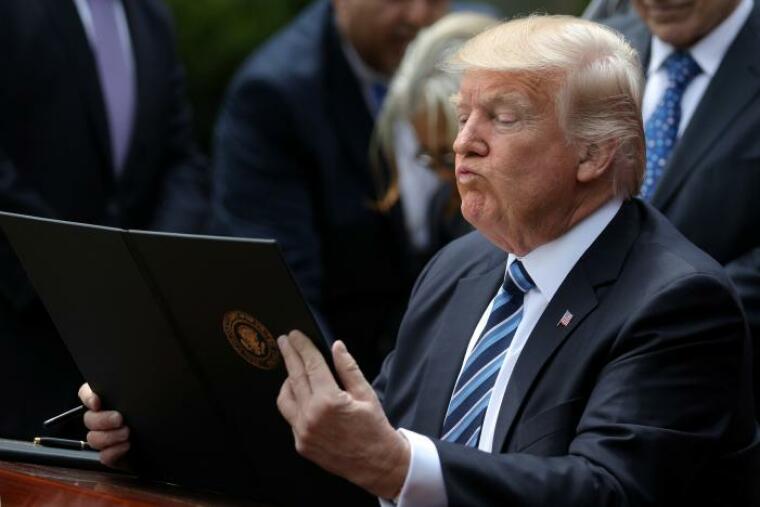Trump's religious liberty executive order gets mixed reviews from conservatives

President Donald Trump signed a highly anticipated executive order on religious liberty in front of faith leaders at the White House Rose Garden on the National Day of Prayer on Thursday. Some conservative leaders considered the move as a step in the right direction, but others say it does not go far enough to protect religious freedom.
According to a summary released by the White House on Wednesday, the order addresses three areas of concern.
The first provision attempts to fulfill Trump's campaign promise to repeal the Johnson Amendment, which prohibits tax-exempt organizations from endorsing political candidates. It calls on the IRS to avoid taking adverse action against religious organizations on the basis of speech that can be considered political.
Another section of the order provides "regulatory relief" for religious organizations that have objections to the Obamacare mandate, which requires employers to pay for contraceptives and abortifacient drugs in their healthcare plans.
The third section gives "religious liberty guidance" to all agencies, notifying them about the conscience protections provided under federal law, according to World.
The order was praised by Focus on the Family founder James Dobson, who said that Trump's action "must be the first among others because the efforts by previous administrations to marginalize conservative communities of faith were real, thorough and complex."
Family Research Council president Tony Perkins said that the religious liberty order is the start of a process in reversing the "devastating trend set by the last administration to punish charities, pastors, family owned businesses and honest, hard-working people simply for living according to their faith."
But Gregory Baylor, an attorney with Alliance Defending Freedom, said that the order still leaves Trump's campaign promises on religious liberty unfulfilled.
He said that it was "disappointingly vague, especially given the long existence of an obvious means of solving the problem: crafting an exemption that protects all those who sincerely object on religious and moral grounds so that they can continue to serve their communities and the most vulnerable among them."
Ryan Anderson, a senior fellow at the conservative think tank Heritage Foundation, said that the language of the executive order was too soft and that it "fails to address most pressing religious liberty threats."
Johnnie Moore, a member of Trump's evangelical advisory board who was at the signing ceremony, said that Christian conservatives are being "unrealistic" for thinking that Trump can solve all religious liberty issues in one executive order.
He argued that the Obama administration was so thorough in "dismantling" religious liberty that it would be impossible to fix in one sweeping action.
The American Civil Liberties Union has already vowed to file a lawsuit against the order even before the White House published the final language of the order, according to The Christian Post. Other liberal and pro-LGBT groups have also expressed their intentions to take legal action against the order earlier this week.
 Christians don't have to affirm transgenderism, but they can’t express that view at work: tribunal
Christians don't have to affirm transgenderism, but they can’t express that view at work: tribunal Archaeology discovery: Medieval Christian prayer beads found on Holy Island
Archaeology discovery: Medieval Christian prayer beads found on Holy Island Presbyterian Church in America votes to leave National Association of Evangelicals
Presbyterian Church in America votes to leave National Association of Evangelicals Over 50 killed in 'vile and satanic' attack at Nigerian church on Pentecost Sunday
Over 50 killed in 'vile and satanic' attack at Nigerian church on Pentecost Sunday Ukrainian Orthodox Church severs ties with Moscow over Patriarch Kirill's support for Putin's war
Ukrainian Orthodox Church severs ties with Moscow over Patriarch Kirill's support for Putin's war Islamic State kills 20 Nigerian Christians as revenge for US airstrike
Islamic State kills 20 Nigerian Christians as revenge for US airstrike Man who served 33 years in prison for murder leads inmates to Christ
Man who served 33 years in prison for murder leads inmates to Christ


 Nigerian student beaten to death, body burned over ‘blasphemous’ WhatsApp message
Nigerian student beaten to death, body burned over ‘blasphemous’ WhatsApp message 'A new low': World reacts after Hong Kong arrests 90-year-old Cardinal Joseph Zen
'A new low': World reacts after Hong Kong arrests 90-year-old Cardinal Joseph Zen Iran sentences Christian man to 10 years in prison for hosting house church worship gathering
Iran sentences Christian man to 10 years in prison for hosting house church worship gathering French Guyana: Pastor shot dead, church set on fire after meeting delegation of Evangelicals
French Guyana: Pastor shot dead, church set on fire after meeting delegation of Evangelicals ‘Talking Jesus’ report finds only 6% of UK adults identify as practicing Christians
‘Talking Jesus’ report finds only 6% of UK adults identify as practicing Christians Mission Eurasia ministry center blown up in Ukraine, hundreds of Bibles destroyed: 'God will provide'
Mission Eurasia ministry center blown up in Ukraine, hundreds of Bibles destroyed: 'God will provide' Church holds service for first time after ISIS desecrated it 8 years ago
Church holds service for first time after ISIS desecrated it 8 years ago Burger King apologizes for 'offensive campaign' using Jesus' words at the Last Supper
Burger King apologizes for 'offensive campaign' using Jesus' words at the Last Supper Uganda: Muslims abduct teacher, burn him inside mosque for praying in Christ’s name
Uganda: Muslims abduct teacher, burn him inside mosque for praying in Christ’s name